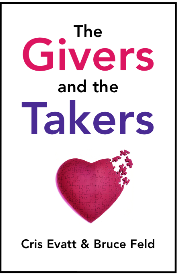
Create a support group for women who give too much and receive too little, and who feel resentful about it. Bring people together who are coping with similar issues. Below are a few suggestions.
GUIDELINES FOR MEETINGS
• Begin and end on time.
• Meetings should last roughly one-and-a-half hours.
• The meeting place can take place in someone’s home, preferably in a cheerful room without distractions.• Serve tea and snacks. Drinks, but not food, may be consumed during the meeting.
• Participants should read The Givers & the Takers before their first meeting.
THE GROUP LEADER
• Ideally, the leader is a psychotherapist, life coach, or workshop leader.
• The leader introduces herself as the person who set up the meeting, explains that everything discussed in the group is to be kept completely confidential, and that she is dealing with the same issues.
• Three basic rules: no advice-giving, visible sympathy, or criticism of others.
• Keep to the topic being discussed.

